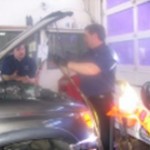The power steering system is one of the most critical parts of your vehicle. Rack and pinion steering is the most common type of steering system in cars and minivans and you can also find it on some SUVs and trucks. Rack and pinions are, simply put, a pair of gears that work together to steer the vehicle. In order to operate smoothly, the gears need hydraulic fluid, also called power steering fluid, to transmit power to your car’s power steering system. If the power steering fluid is dirty and isn’t flushed, the risk of damage to the entire power steering system is increased. A power steering flush is simply draining out your car’s old power steering fluid and replacing it with fresh power steering fluid. The function of the fluid is to transmit hydraulic pressure so you can steer your car easily in every driving situation, from frigid cold to scorching heat. It also lubricates the pump, controls the valves, and ensures a quiet operating system.
Over a period of time, the internal power steering components, as well as the seals and O-rings have been subjected to wear and tear and begin to wear out. When this happens the power steering fluid gets contaminated with broken down debris, this forces the power steering pump to work harder. The power steering pump now has to pump the debris as well as the fluid and it eventually breaks down. We have noticed that the 1996-1999 Toyota 4-Runners and Toyota Tacomas are more prone to leaks if their systems aren’t flushed routinely. If you drive one of these vehicles you might want to have the fluid checked to make sure you don’t need a power steering flush. The power steering fluid should appear either an amber or pink in color when it is fresh. When it appears significantly darker than its color when it was fresh, it’s time for a change. Check your owner’s manual for your vehicles recommendations. If they aren’t available, a good rule of thumb is to change the power steering fluid as often as you change your engine coolant. Since the fluid is the least expensive part of your power steering system and flushing it can help to prolong the life of the other, more expensive parts of the system, it is something that should be seriously considered.
For all of your Denver Auto Repair needs, trust Express Car Care. Call (303) 691-2760 or stop by our shop today.

Leave a Reply
You must be logged in to post a comment.